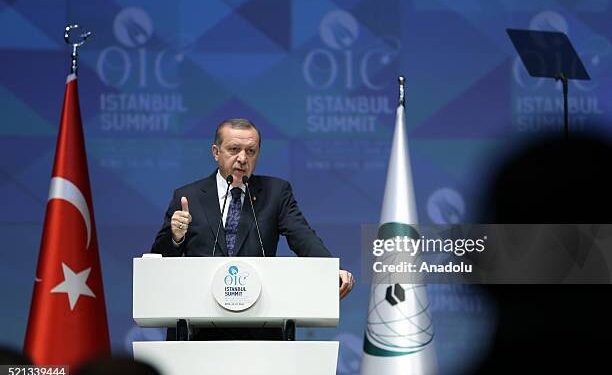Turkish President Recep Tayyip Erdogan has reiterated the critical role that the Organization of Islamic Cooperation (OIC) must play in addressing Israeli aggression in Palestine. Erdogan’s remarks come at a time of heightened tensions and conflict in the region, urging the Muslim world to demonstrate greater unity and leadership.
Erdogan’s Stance on the Role of the OIC
On November 11, 2024, during a press conference in Ankara, President Erdogan addressed the ongoing violence in Gaza and the West Bank, emphasizing that the OIC has a “moral and strategic obligation” to act decisively. He stated, “The silence and fragmentation within the Muslim world have allowed for continued suffering and violence in Palestine. It is high time for the OIC to rise to its founding purpose — to defend and safeguard the rights of the Palestinian people.” He underlined that without action, the OIC risks diminishing its credibility on the international stage.
What Can the OIC Do Differently?
Erdogan’s call included a clear critique of past inaction. The Turkish leader proposed specific measures, such as convening an emergency summit to develop a united strategy for intervention and lobbying for international peace initiatives. “A summit must be organized immediately, bringing together our member states to discuss coordinated action, from diplomatic pressure to humanitarian support,” he stated.
Erdogan argued that the OIC, which was established in 1969 as a response to the Al-Aqsa Mosque fire, has historically had the power to influence global opinion and policy when acting collectively. However, he pointed out that recent years have shown a concerning hesitation in addressing crises effectively. “We must return to the OIC’s roots: serving as the collective voice for the Muslim world,” he added.
Criticism of Global Inaction
Erdogan also criticized the international community’s inaction and what he perceives as a double standard when addressing violations of human rights in Palestine compared to other global crises. He expressed disappointment in the limited responses from Western countries and highlighted that sanctions or condemnations are often selective.
“The world needs to show the same vigor for peace in the Middle East as it does elsewhere,” Erdogan said. “We cannot allow geopolitical interests to overshadow basic human rights.”
A Call for Humanitarian Efforts
Beyond political initiatives, Erdogan urged member states to amplify humanitarian aid to Gaza and the West Bank. Current conditions, exacerbated by blockades and continuous military strikes, have left these areas in desperate need of medical supplies, food, and essential services. Turkey has already initiated aid shipments, but Erdogan stressed the need for a larger, coordinated response.
“The people of Palestine are facing more than political aggression; they are facing a humanitarian catastrophe,” Erdogan said. He encouraged the OIC to mobilize resources quickly, adding, “An injury to one is an injury to all. We must remember this as a community.”
What Does This Mean for the OIC’s Future?
This call to action is in line with Erdogan’s history of advocating for Palestinian rights and his broader vision for unity among Muslim nations. Analysts suggest that Erdogan’s proposal for an emergency OIC summit could be a pivotal moment for the organization to reassert its influence. If successful, it may restore confidence in the OIC as a capable body that not only speaks for but acts on behalf of the Muslim world.
Erdogan concluded his statement by expressing hope: “Our unity is our strength. Let us ensure that history remembers the OIC as a beacon of hope and justice, not as a body that stood by in silence.”
As global and regional actors await the OIC’s response, the coming weeks could determine whether Erdogan’s appeal catalyzes meaningful change or simply echoes amid ongoing political complexities.
Related Stories:
OIC urged for diplomatic action on the issue of Kashmir
Hamas Chief Haniyeh Arrives in Turkey for Talks Amid Escalating Gaza Conflict
Turkey and South Africa address Israel Over Gaza War at Climate Summit
















